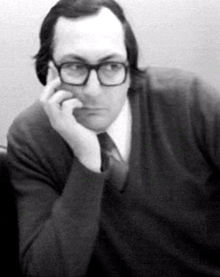Maurice Godelier

| Part of a series on |
| Economic, applied, and development anthropology |
|---|
| Social and cultural anthropology |
Maurice Godelier (born February 28, 1934[citation needed]) is a French anthropologist who works as a Director of Studies at the School for Advanced Studies in the Social Sciences. He is one of the most influential French anthropologists and is best known as one of the earliest advocates of Marxism's incorporation into anthropology. He is also known for his field work among the Baruya in Papua New Guinea from the 1960s to the 1980s.[1]
Early life and education
Godelier was born to a poor family in provincial France in the commune Cambrai.[1]
In 1955,
In 1981, he received an honorary degree from the
Career
In 1963, Godelier initiated the first program on
From 1966 to 1969, Godelier conducted his first major anthropological field study on the Baruya in Papua New Guinea. His research provided significant contributions to the limited understanding of New Guinea cultures. In 1982, he used his research to write an ethnography on the Baruya. The book, entitled The Making of Great Men, discusses sex- and gender-based inequality and provided insight into the systems of power in Melanesia. His analysis of the systems of power was further developed in Big Men and Great Men, published in 1991, which he co-edited with Marilyn Strathern.[1]
In the late 1990s, Godelier addressed the future of peripheral societies under the effects of world capitalism and a new analysis of kinship theory focusing on gender inequality and sexuality.[1] In 1995, he founded the Center for Research and Documentation on Oceania, which he directed until 1999.[5]
From 2000 to 2003, Godelier served on various organizations related to research in social sciences in Europe and his anthropological work in
See also
- Karl Wittfogel
Publications
- Rationalité et irrationalité en économie – 1969 (2 volumes) (Rationality and Irrationality in Economics, London : NLB, 1972).
- La production des grands hommes. Pouvoir et domination masculine chez les Baruya de Nouvelle Guinée, Ed. Fayard (1982). (The Making of Great Men. Male domination and Power among the New Guinea Baruya, Cambridge University Press, 1986). Prize of the French Academy.
- L’idéel et le matériel, Ed. Fayard (1984). (The Mental and the Material. Thought, economy and society, Verso,1986).
- L’énigme du don, Ed. Fayard (1996). (The Enigma of the Gift, Chicago, Cambridge; ISBN 978-0-226-30045-0).
- Meurtre du père, sacrifice de la sexualité,1996.
- La production du corps. Approches anthropologiques et historiques and Le corps humain. Conçu. Supplicié, possédé, cannibalisé. Texts collected and edited by Maurice Godelier and Michel Panoff. Amsterdam, Archives contemporaines (1998).
- Godelier, Maurice (2004). Métamorphoses de la parenté. Paris: Fayard.ISBN 2-213-61490-3. OCLC 61137773.
- Lévi-Strauss, Paris: Le Seuil, 2013, (592 p.) / Tr. by Nora Scott, (2018) Claude Lévi-Strauss, A Critical Study of His Thought, Verso books, (560 p.).
References
- ^ a b c d e f g h Niko Besnier and Alan Howard. (April 1997) "Maurice Godelier". Archived from the original on January 6, 2009. Retrieved 2013-09-05.
{{cite web}}: CS1 maint: bot: original URL status unknown (link). Newsletter of the Association for Social Anthropology in Oceania. - ^ a b c "CREDO - le CREDO". Archived from the original on 2008-11-15.
- ^ "CREDO - le CREDO". Archived from the original on 2013-07-27.
- ^ "Vernant Jean-Pierre". www.ex-pcf.com. Retrieved 2022-01-25.
- ^ "Communique de presse - Maurice Godelier, anthropologue, medaille d'Or du CNRS pour l'annee 2001". www.cnrs.fr. Archived from the original on 8 May 2013. Retrieved 12 January 2022.
